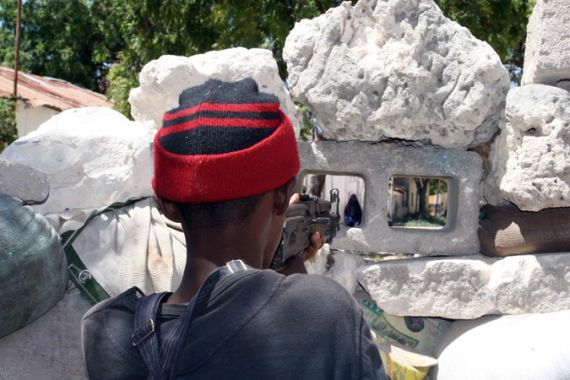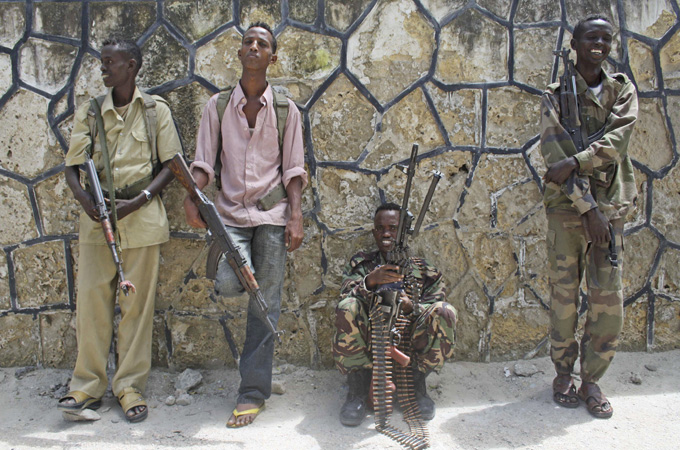In search of a Somali constitution
Draft constitution could deepen Somalia’s crisis, but an obvious solution may be being overlooked.

 |
| The draft constitution could contribute to the Balkanisation of Somalia [EPA] |
The debate over constitution-making in Somalia has moved to centre-stage and the international community is in the driver’s seat.
But, its approach is simplistic, unfeasible and dangerous. The proposed draft constitution will not only fail to combat Somalia’s conflicts, but will, rather, contribute to the Balkanisation of the country.
A simplistic approach
The international community’s approach has been based on the groundless assumption that Somalia does not already have a constitution.
But Somalia does have a legitimate, balanced, democratic and Somali-owned constitution, which was drafted in 1960 and ratified through a referendum in 1961. Moreover, this constitution is not identified with any of the country’s groups.
The international community, however, is reluctant to support the 1960 constitution for two reasons.
Firstly, some domestic actors have wrongly attributed the dictatorial practices of the military regime to the unitary nature of the Somali state. This fallacious logic asserts that the 1960 constitution was a unitary state system and that it is because of that system that the ruling elite abused its power. In order to avoid a potential repeat of this abuse, some Somalis have called for a federal system.
But this is a flawed diagnosis. There is nothing wrong with the unitary state system. In fact, most of the world’s democracies have a unitary state system.
Some also add the criticism that a clan-based power-sharing formula is missing from the 1960 constitution.
Secondly, Somalia’s neighbours believe that the 1960 constitution is irredentist in nature since it was created in the heydays of Somali nationalism. Article 6(4), which seeks the re-unification of Somalia through peaceful and legal means, is their main concern and the current draft constitution has omitted all irredentist articles and clauses.
Fortunately, both concerns can be easily addressed.
Regarding the first criticism, the 1960 constitution provides mechanisms that mandate decentralisation if the goal is to empower local communities. Moreover, any legitimate concerns that Somali groups have can – and must – be easily accommodated.
Regarding concerns about the irredentist elements of the 1960 constitution, I think Somalis must confront these issues head on through a public debate; simply omitting them from the draft constitution is not appropriate. If stakeholders debate these issues, as sensitive as they are, a pragmatic and win-win solution can be reached.
An unfeasible project
Security issues make it unfeasible to ratify the draft constitution at this time. Knowing this fact very well, Ahmedou Ould Abdallah, the former special envoy of the secretary-general of the United Nations, proposed an alternative way of ratifying the draft constitution. Comparing the constitution to the European Union charter, which was ratified by the legislatures of 27 countries, he recommended that Somalia’s 550-member parliament sign off on it.
But this suggestion has its shortcomings.
Firstly, according to the Transitional Federal Charter of the Somali Republic (TFC), which through its ‘immutable principles’ calls for the ratification of the constitution through a referendum, this would be illegal.
Secondly, unlike in EU states, Somalia’s parliamentarians are not elected and they cannot be a substitute for the will of the Somali people.
Finally, the international community is contradicting itself. It argues that the government cannot amend or change the content of the draft constitution. Yet, it wants the Transitional Federal Government (TFG) to ratify the draft constitution – a contradiction in terms.
Dangerous prescriptions
The draft constitution is dangerous as it prescribes unsustainable structures that could lead to the dismemberment of the country.
Some major issues are predetermined without opening them to public debate. For instance, a federation has been prescribed even though it is not appropriate in the Somali context.
Only 12 per cent, or 24 countries, of world states are federal states. Only three of these countries are African: Nigeria, Ethiopia and South Africa. Most of the 24 countries are large, geographically complicated and have diverse populations.
Somalia lacks the characteristics of federal states – it is small and its people are largely homogeneous. It is also poor and cannot afford to pay for one level of government, let alone multiple levels of government. The necessary human resources to serve three levels of government are lacking and there are no agreed upon regions that can federate.
Most importantly of all, the primary goal is to stabilise Somalia, but prescribing a federal system for Somalia will compromise stability by creating unnecessary competition and thus adding fuel to the fire.
If the current thinking of the international community is taken to its logical conclusion, many clan-based regions will be created, thus re-enforcing tribalism and sub-clan politics and undermining state-building efforts. Many communities, particularly unarmed clans and minority groups will experience discrimination if a federal system is adopted.
That said, some form of decentralisation is needed. But, I believe federation is unnecessary and it is context-inappropriate. Moreover, there are alternative ways of instituting decentralisation.
Wrong legislative institutions
The draft constitution also proposes symmetrical bicameral institutions – two houses that have the same powers to legislate. Such an arrangement, however, constitutes a duplication of services as just one house would be sufficient to do the job.
But, the more problematic aspect of this is that one chamber will represent undefined regional states and members of that chamber will be selected by legislatures of those unknown regions. Such a structure does not make sense and would be impossible to implement.
A bicameral system is possible, but may not be desirable.
As in some other African states, the second chamber could represent clans. Ghana and Botswana, two of the most stable countries in Africa, have an institutionalised tribal system and have created a House of Chiefs.
But a closer and more familiar example is Somaliland, which also has a bicameral system where one chamber represents the people and the second represents clans. Somaliland’s Guurti or clan elders played a significant role in pacifying the region and since its bicameral system has been successful, there is a case to be made for Somalia replicating this.
A win-win solution
The president, the new cabinet and the parliament of the TFG must take the lead and propose reverting to the 1960 constitution.
With this, it must address the major concerns voiced by both domestic and external actors, and through this process, the Somali people may be able to reclaim their lost agency.
If the TFG is serious, it can present a comprehensive strategy that addresses decentralisation, a clan-based power-sharing formula and issues related to the irredentist nature of the 1960 constitution in less than a month.
The sitting parliament can then make the necessary adjustments to the document and a permanent government may result from this exercise.
For the international community, besides the difficulty of justifying the millions of dollars spent on the draft constitution, the 1960 constitution offers all of the characteristics it favours: It is a democratic, legitimate and Somali-owned document.
There is no need to go through with a referendum at this time. Many Somalis, particularly political stakeholders, are familiar with the constitution since it has been used for nine years.
Therefore, there is no reason for the international community to triangulate or impose unworkable arrangements on the Somali people.
This is a win-win solution and the international community must support it.
Afyare Elmi teaches international politics at the International Affairs Department of Qatar University and is the author of ‘Understanding the Somalia Conflagration: Identity, Political Islam and Peacebuilding’.
The views expressed in this article are the author’s own and do not necessarily reflect Al Jazeera’s editorial policy.